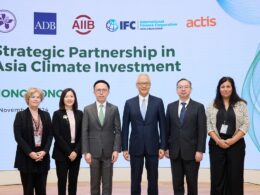The International Finance Corporation (IFC) has partnered with India’s Bajaj Finance Limited (BFL), committing $400 million of BFL’s $1 billion fundraising effort. This strategic investment aims to enhance access to climate finance for electric vehicles (EVs) and energy-efficient consumer goods (EECG), while also supporting women-owned microenterprises and women micro-borrowers across India.
Bajaj Finance Limited, a leading Non-Banking Finance Company (NBFC) under Bajaj Finserv Ltd, has established a strong presence in the EV and EECG sectors. The infusion of $400 million from IFC will enable BFL to expand its financing options for customers purchasing EVs, including two-wheelers, three-wheelers, and four-wheelers. Additionally, the funding will strengthen BFL’s capabilities in the EECG market, fostering greater adoption of energy-efficient products among consumers.
Sandeep Jain, Chief Financial Officer & Chief Operating Officer, Bajaj Finance Ltd. said, “Responsible business practices, driven by our ESG principles, are foundational to how we do business. IFC’s funding of $400 million serves as a catalyst for diversifying our financing sources. With this, our volume of outstanding climate loans stands to increase 4x to $600 million in 2027 from over $150 million in 2024. It helps us enable greater usage of EVs and energy-efficient consumer goods, support more women-owned micro-borrowers, and contribute better to India’s inclusive and low carbon future.”
Imad N. Fakhoury, Regional Director for South Asia, IFC said, “Accelerating climate financing is crucial for India to meet its net-zero goals. IFC’s investment in Bajaj Finance will boost market competition, inspiring other NBFCs and investors to expand their financing for energy-efficient solutions, e-mobility, and microfinance. Together with Bajaj Finance, a like-minded partner, we are fully committed to accelerating green growth for the country, while also empowering women and closing the gender gap.”
India, the world’s third-largest energy-consuming nation, is rapidly expanding its energy sector. Millions of households are expected to purchase new appliances, air conditioners, and vehicles in the coming years. By 2050, the demand for air conditioners alone is projected to increase ninefold, significantly boosting greenhouse gas emissions. The household appliances market in India is estimated to reach $59.19 billion in 2024, with an annual growth rate of 7.35 percent.
Energy-efficient consumer goods (EECG) are pivotal to India’s low-carbon growth strategy, particularly as households account for 26 percent of overall energy consumption and 25 percent of electricity usage. EECG not only help consumers save on electricity bills but also support India’s ambition to reduce emissions intensity by 45 percent by 2030. Despite these benefits, awareness and adoption of EECG remain limited. The Bureau of Energy Efficiency-led Star Label program rates the energy efficiency of consumer goods, but only 26 percent of products requiring a mandatory star rating (excluding LED lamps) achieve a 4- or 5-star efficiency rating.
Electric vehicles (EVs) are also central to India’s decarbonization efforts, with transportation contributing around 12 percent of the country’s emissions. EV adoption is on the rise, yet high financing costs and perceived risks continue to hinder widespread uptake.
Beyond climate finance, the partnership with IFC will significantly bolster support for women-owned microenterprises and micro-borrowers, which are crucial for India’s inclusive economic growth. Microenterprises constitute 99 percent of the 63 million Micro, Small, and Medium Enterprises (MSMEs) in India, with the majority being women-owned. Enhancing access to credit for these businesses can unlock substantial growth potential and drive economic empowerment for women nationwide.















